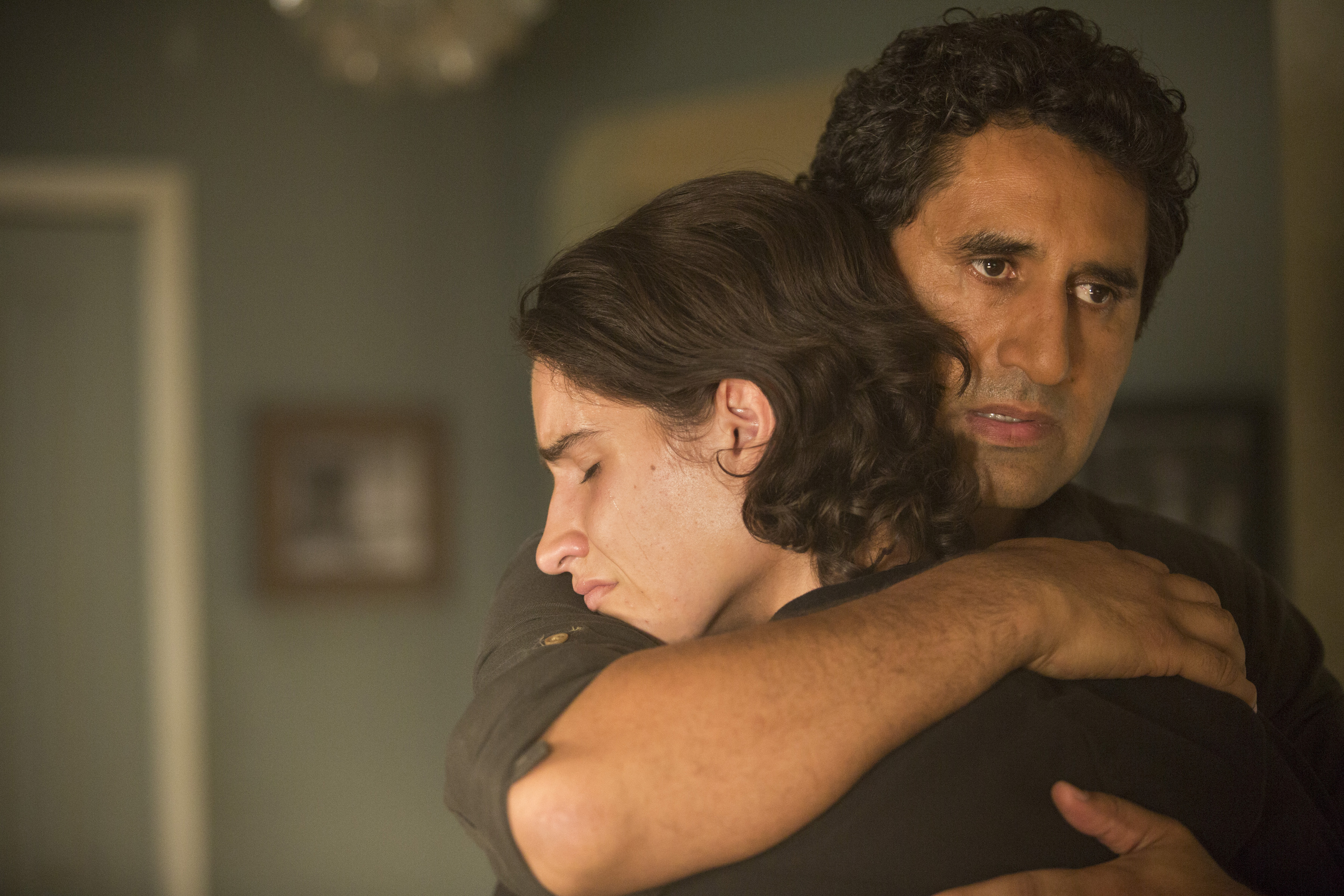Fear the Walking Dead episode 5 recap: Apocalypse now
The penultimate episode of the zombie series' first season forces our heroes to make horrific moral compromises in order to survive


Sunday night's "Cobalt" was the penultimate episode of Fear the Walking Dead's first season, and the series is making its first big statement about life, survival, and human nature in the wake of the apocalypse. Indeed, as our heroes adjust to the bleakness of life in the new world order, Fear has made its central moral perfectly clear: If you're going to survive, you'd better be ruthless.
Not everyone has managed to take that lesson to heart. Let's get this out of the way now: Travis is useless. As an ostensible "leader" who has totally failed to provide any meaningful leadership (and may actually have helped the military by fostering complacency), Travis' consistent blind trust in the goodness of others is exactly what will get himself and the people he loves killed. He refuses to kill a zombie when he sees a reminder of her humanity. Worst of all, Travis is living in denial about the world around him; note how he corrects Moyers, who says he "was" a teacher, by insisting that he "is" a teacher — desperately clinging to an identity that has already been lost.
None of this is to say that Travis is a bad person; if anything, he's the most moral and likable protagonist Fear has introduced. But he's also hopelessly ill-equipped to survive in a world where the power dynamics have suddenly and brutally flipped against anyone whose instincts tend toward kindness. If any major character is going to die in next week's finale, it's him.
The Week
Escape your echo chamber. Get the facts behind the news, plus analysis from multiple perspectives.

Sign up for The Week's Free Newsletters
From our morning news briefing to a weekly Good News Newsletter, get the best of The Week delivered directly to your inbox.
From our morning news briefing to a weekly Good News Newsletter, get the best of The Week delivered directly to your inbox.
Fortunately, Madison seems self-assured enough to go on with or without him. Early in "Cobalt," she catches Daniel Salazar as he prepares to torture a soldier for information about the National Guard's true plans for the quarantine zone. When Madison objects to the harsh treatment, Daniel fires back with a pointed question: "Which is it: You don't want him hurt, or you don't want to know about it?"
In the end, she goes down the darkest path of all: She's willing to let the soldier be tortured, and she's not afraid to look at it. It's an ugly, unpleasant thing to watch Daniel commit torture to get information — but it's also the one thing anyone does to even the odds between the National Guard and the people they claim to be protecting. The soldier eventually confesses the true meaning of the code word "Cobalt," which was repeatedly uttered over the military's private radio channel. It's a command code to evacuate from Los Angeles, with a mandate to perform "humane termination" on anyone who is deemed even the slightest risk for zombification. The remaining survivors, presumably, will be left to fend for themselves. The plan will begin the following morning, giving the survivors just enough time to come up with a plan to strike back. And they would never have known if Daniel hadn't tied a man to a chair and taken a straight razor to his arm.
This is the point at which I started to feel a little uneasy with the uniformity of Fear's moral compass, which more or less endorses torture as a necessary evil. It might just be that Fear's brief six-episode first season doesn't allow for the kind of nuance that allows our heroes to step back and think about what they're doing — but it would be nice to see some kind of middle ground: the recognition that compassion is its own kind of strength, or that there's more strategic value in making friends than enemies, or even just the acknowledgement that this sheer loss of human decency should be mourned.
The closest we come to a new perspective is the introduction of Nick's charismatic new cellmate, who identifies himself as a "closer." He trades away some expensive-looking jewelry to keep the soldiers from hauling Nick away — not out of kindness, but to have Nick in his debt whenever things go south. In a speech near the end of the episode, the closer almost relishes the many horrors on the horizon. "The game has changed," he says. "We returned to the old rules. And the people who won the last round, with their grande lattes and their frequent flyer miles, are about to become the buffet."
A free daily email with the biggest news stories of the day – and the best features from TheWeek.com
Is that the kind of person who will come out on top? The episode's creepy final shot — which sees Daniel approaching the gates of a Los Angeles stadium to find a massive horde of zombies pushing to escape — raises a similarly awful moral quandary. As the soldier explained earlier in the episode, the stadium was the site of a gruesome decision. The virus gradually spread among the people seeking shelter inside the stadium — but when they tried to escape, the military locked the doors, leaving hundreds (if not thousands) of civilians trapped inside. It's a horrific war crime — but is it really worse than risking the lives of everyone in Los Angeles by allowing 2,000-plus zombies to spill out of the stadium and onto the open streets?
That's a horrible question, and there's no easy answer to it. But Fear the Walking Dead has already made its own perspective perfectly clear: In this world, the true survivors are the ones who didn't hesitate to lock those gates. Now that the military has made its priorities known, I suspect they're about to face the next worst thing: a survivor who isn't afraid to open those gates and unleash the full horrors of a zombie horde upon them.
Read more Fear the Walking Dead recaps:
- Fear the Walking Dead episode 4 recap: Life during wartime
- Fear the Walking Dead episode 3 recap: Summer in the city
- Fear the Walking Dead episode 2 recap: Stumbling forward
- Fear the Walking Dead premiere recap: Only the end of the world again
Scott Meslow is the entertainment editor for TheWeek.com. He has written about film and television at publications including The Atlantic, POLITICO Magazine, and Vulture.
-
 Nepal chooses toddler as its new ‘living goddess’
Nepal chooses toddler as its new ‘living goddess’Under the Radar Girls between two and four are typically chosen to live inside the temple as the Kumari – until puberty strikes
-
 October 5 editorial cartoons
October 5 editorial cartoonsCartoons Sunday's political cartoons include half-truth hucksters, Capitol lockdown, and more
-
 Jaguar Land Rover’s cyber bailout
Jaguar Land Rover’s cyber bailoutTalking Point Should the government do more to protect business from the ‘cyber shockwave’?
-
 Walter Isaacson's 'Elon Musk' can 'scarcely contain its subject'
Walter Isaacson's 'Elon Musk' can 'scarcely contain its subject'The latest biography on the elusive tech mogul is causing a stir among critics
-
 Welcome to the new TheWeek.com!
Welcome to the new TheWeek.com!The Explainer Please allow us to reintroduce ourselves
-
 The Oscars finale was a heartless disaster
The Oscars finale was a heartless disasterThe Explainer A calculated attempt at emotional manipulation goes very wrong
-
 Most awkward awards show ever?
Most awkward awards show ever?The Explainer The best, worst, and most shocking moments from a chaotic Golden Globes
-
 The possible silver lining to the Warner Bros. deal
The possible silver lining to the Warner Bros. dealThe Explainer Could what's terrible for theaters be good for creators?
-
 Jeffrey Wright is the new 'narrator voice'
Jeffrey Wright is the new 'narrator voice'The Explainer Move over, Sam Elliott and Morgan Freeman
-
 This week's literary events are the biggest award shows of 2020
This week's literary events are the biggest award shows of 2020feature So long, Oscar. Hello, Booker.
-
 What She Dies Tomorrow can teach us about our unshakable obsession with mortality
What She Dies Tomorrow can teach us about our unshakable obsession with mortalityThe Explainer This film isn't about the pandemic. But it can help viewers confront their fears about death.
